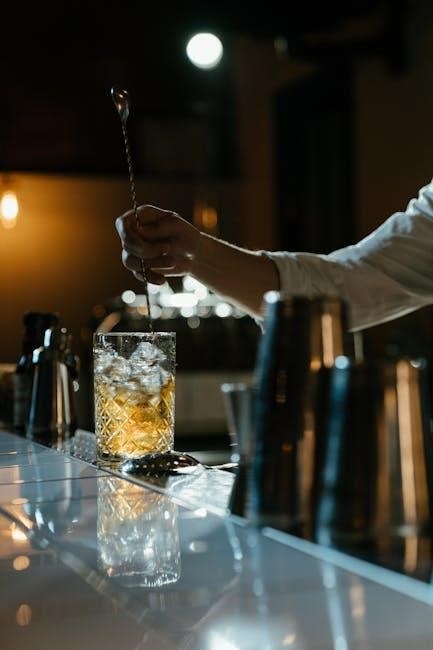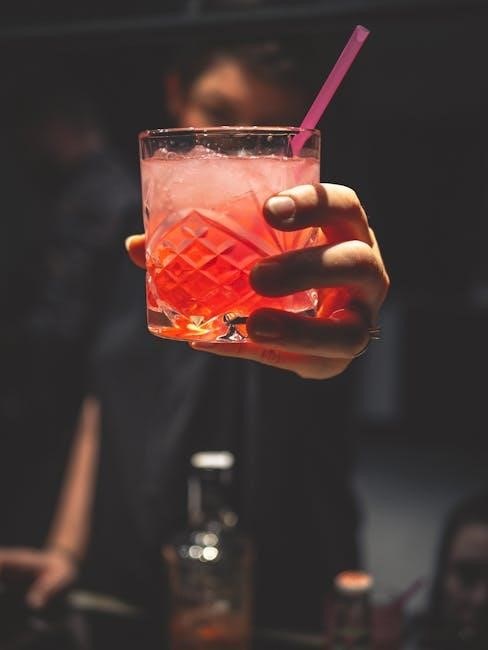
bartender duties and responsibilities pdf
Bartenders are essential in hospitality, ensuring seamless service and creating a welcoming atmosphere․ Their primary duties include preparing drinks, managing orders, and maintaining customer interaction․ They also handle legal compliance, safety, and bar upkeep, making their role multifaceted and crucial for a smooth operation․

1․1․ Key Responsibilities of a Bartender
A bartender’s primary role involves preparing and serving beverages, ensuring quality and presentation․ They must greet customers, take orders accurately, and recommend drinks based on preferences․ Managing cash and credit transactions, maintaining cleanliness, and restocking supplies are also critical tasks․ Bartenders are responsible for monitoring patrons’ alcohol intake to prevent over-serving, ensuring legal compliance and safety․ They also handle opening and closing duties, such as setting up the bar and securing equipment․ Effective communication and conflict resolution skills are essential for mediating disputes and maintaining a positive environment․ Additionally, bartenders often collaborate with other staff to ensure seamless service during busy periods․ Their role requires multitasking, attention to detail, and the ability to work under pressure while maintaining a friendly and professional demeanor․

1․2․ Importance of Customer Interaction in Bartending
Customer interaction is a cornerstone of bartending, as it directly impacts the overall experience and satisfaction of patrons․ Bartenders serve as the face of the establishment, creating a welcoming atmosphere that encourages repeat visits․ Effective communication helps bartenders understand drink preferences, enabling them to make tailored recommendations and enhance the dining experience․ Building rapport fosters loyalty, turning casual visitors into regular customers․ Additionally, bartenders must handle difficult situations, such as managing intoxicated patrons or mediating conflicts, with professionalism and tact․ Their ability to navigate these interactions ensures a safe and enjoyable environment․ Excellent interpersonal skills also allow bartenders to act as ambassadors for the bar, promoting specials and fostering a positive reputation․ By balancing attentiveness with discretion, bartenders strike the perfect chord, making every customer feel valued․ This personal connection not only boosts satisfaction but also drives business success, highlighting the vital role of customer interaction in bartending․
Primary Bartender Duties


Bartenders are responsible for preparing and serving beverages, managing drink orders, and handling payments․ They maintain the bar area, ensuring cleanliness and organization․ Their role also involves monitoring inventory, restocking supplies, and ensuring customer satisfaction while adhering to safety and hygiene standards․
2․1․ Preparing and Serving Drinks
Preparing and serving drinks is a core duty of bartenders, requiring both skill and creativity․ They must expertly mix, shake, or pour beverages to meet recipes and presentation standards․ This includes crafting classic cocktails, beer, wine, and custom creations based on customer preferences․
Bartenders are responsible for monitoring drink quality, ensuring flavors balance, and using fresh ingredients․ They must also stay updated on drink trends and techniques to innovate and adapt to changing tastes․
Managing multiple orders simultaneously is essential, especially during peak hours․ Bartenders must work efficiently, maintaining attention to detail to avoid mistakes․ They also handle special requests, such as non-alcoholic options or dietary modifications․
Providing a clean and hygienic workspace is crucial․ Bartenders ensure all tools and glassware are sanitized, and the bar area remains tidy․ This not only enhances safety but also improves the overall customer experience․
Ultimately, bartenders strive to deliver drinks that satisfy customers, fostering a positive and enjoyable atmosphere․ Their ability to balance creativity, efficiency, and customer satisfaction makes them integral to any establishment’s success․
2․2․ Managing Orders and Payments
Managing orders and payments is a critical part of a bartender’s role, requiring strong organizational and interpersonal skills․ Bartenders must accurately take orders, ensuring they understand each customer’s request, especially for customizable drinks like cocktails․ They are also responsible for efficiently processing payments, whether through cash, card, or mobile methods․
Using point-of-sale systems is a key part of this process․ Bartenders must be adept at operating these tools to input orders, manage tabs, and handle refunds or discounts when necessary․ They also need to maintain a balanced cash drawer, ensuring accuracy in handling money and providing correct change․
Handling special requests, such as splitting bills or modifying orders, is another important aspect․ Bartenders must remain patient and professional, even during peak hours when managing multiple transactions simultaneously․ Their ability to multitask ensures smooth service and customer satisfaction․
Additionally, bartenders are often the last point of interaction for customers, making their role in payment processing crucial for a positive experience․ By ensuring transactions are quick and hassle-free, bartenders contribute to overall customer satisfaction and loyalty․

Additional Responsibilities
Bartenders also manage inventory, monitor stock levels, and ensure compliance with legal and safety regulations․ They maintain hygiene standards, handle customer conflicts, and assist with opening/closing procedures, ensuring the bar operates smoothly and safely at all times․
3․1․ Legal and Safety Compliance
Ensuring legal and safety compliance is a critical part of a bartender’s role․ This includes adhering to alcohol service laws, such as verifying the age of patrons and refusing service to those who are intoxicated․ Bartenders must also be aware of liability issues, as they can be held responsible for incidents involving overserved customers․ Additionally, maintaining a safe environment involves monitoring the bar area for potential hazards, managing conflicts between patrons, and intervening when necessary to prevent unsafe situations․ Proper training in these areas is essential to protect both the establishment and its customers; By upholding these standards, bartenders contribute to a responsible and secure atmosphere, ensuring a positive experience for everyone involved․

3․2․ Maintaining the Bar Area
Maintaining the bar area is a vital responsibility for bartenders, ensuring a clean, organized, and functional workspace․ This includes cleaning countertops, washing glasses, and restocking supplies like napkins, straws, and garnishes․ Bartenders must also organize bottles, mixers, and tools to streamline service efficiency․ Regularly checking equipment, such as blenders and coolers, ensures everything operates smoothly․ Additionally, side work duties involve tasks like polishing glasses, refilling ice, and preparing garnishes, which are essential for a polished presentation․ A well-maintained bar not only enhances the customer experience but also prevents accidents and promotes a professional environment․ By prioritizing cleanliness and organization, bartenders create a space that is both functional and visually appealing, contributing to the overall success of the establishment․